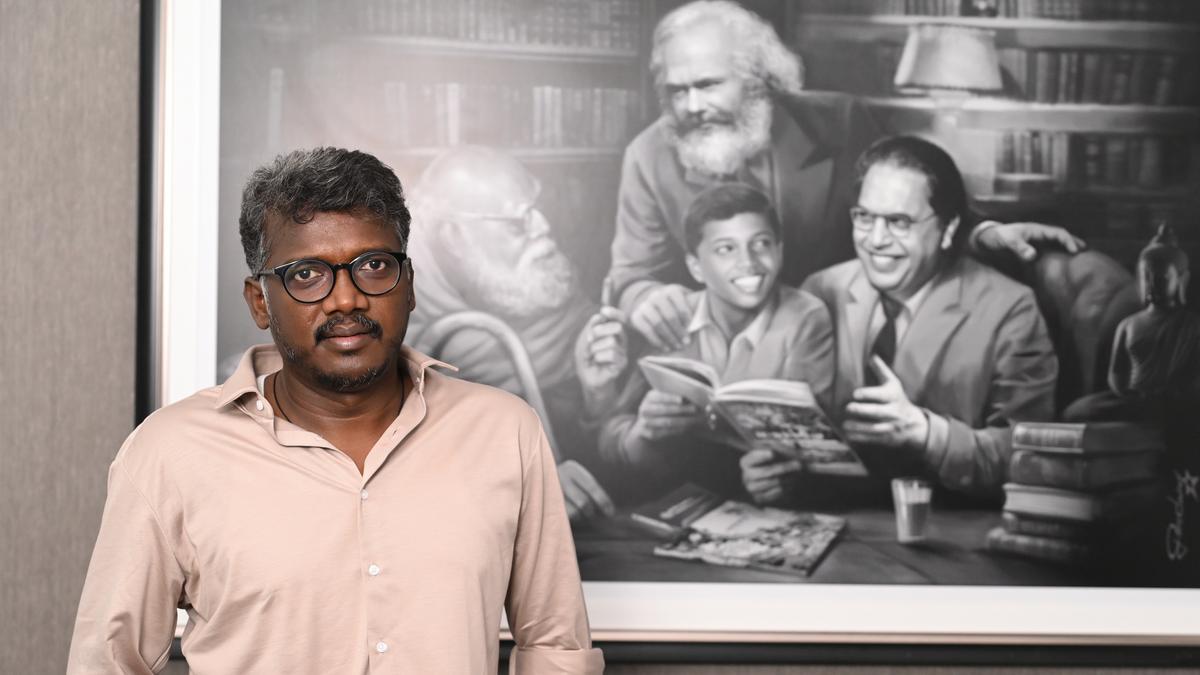
The largest piece of artwork adorning Mari Selvaraj’s office is a monochrome depiction of a young Mari sitting at a table surrounded by books authored by himself and visionaries BR Ambedkar, Periyar, and Karl Marx. It’s a gift that fills Mari with joy because it signifies how someone thought of creating such a meaningful piece. “The books I’ve written are deeply rooted in the understanding I gained from the works of these three icons. We have stories; what’s crucial is the perspective from which we are narrating those stories,” he mentions.
As Mari Selvaraj’s ‘Vaazhai’ gears up for release, the filmmaker reflects on the journey and the themes embedded in his latest project. The difference between the director’s approach to his previous ventures, such as ‘Maamannan,’ and the challenges faced in bringing ‘Vaazhai’ to life are palpable. “I was anxious about the business aspects of ‘Maamannan’ given the prominent names associated with it. However, with ‘Vaazhai,’ my anticipation stems from seeing how those who know me personally will react. The film captures a part of my life, and narrating it as a story where the director himself becomes the victim was a unique challenge.”
Mari Selvaraj believes that societal experiences shape individuals, and translating such a personal experience into a film like ‘Vaazhai’ offers a genuine peek into his life and societal views. “This society has given me a certain experience. By blending that experience with my current understanding, and juxtaposing it with today’s societal context to create a film, it provides valuable insights for others on who I am, where I come from, and what the society gains from it,” he articulates.
Delving into children’s cinema offers yet another layer of challenge for filmmakers, Mari asserts. “Creating a children’s film truly tests a director’s acumen because it involves operating within their pure world. It tests whether we still possess the innocence required to understand ourselves better and educate others.” He explains that tackling societal issues through a lens that makes it comprehensible for children demands extra thought and effort. “Narrating societal issues through children necessitates a simplified yet thoughtful storytelling approach. Despite having made multiple films, ‘Vaazhai’ fills me with pride about my artistic capabilities.”
Working with children presents unique challenges and rewards. Mari recounts, “The children today are incredibly sharp and the directions given to them are no different from what I’d give any other actors. However, the manner and tone differ significantly. Their reactions often make me forget my directorial role, and I become more like an elder narrating a bedtime story.”
Connecting all his films, Selvaraj sees a natural continuity in his work. “If we were to view the films I’ve done as a series, ‘Vaazhai’ would be the first installment.
. We often find connections among them automatically. The child in ‘Vaazhai’ might fight for education similar to Karnan, attend law school like Pariyerum Perumal, and finally, with his political awareness, evolve into Maamannan. It’s interesting to observe an ordinary individual encountering various issues as they progress through life.”
Mari Selvaraj underscores the role of storytelling in societal development. “Our society has flourished because of stories. Without stories, even the concept of God would have ceased to exist. Stories of our ancestors, dynasties, rulers, and gods have been passed down through ages, through songs, stories, and epics penned by someone. My goal is to make the audience’s time worthwhile by initiating discussions through my films. Even if they disagree, I want them to deliberate on the issues.”
His films aim to stir debates rather than merely entertain. “After watching a film, the audience should come out and reflect upon the society around them, making connections between the reel and real worlds,” Mari adds.
Touching upon gender perspective, Selvaraj acknowledges a gap in his storytelling. “I haven’t started narrating stories from the perspective of women yet. I’ve barely scratched the surface by incorporating sister characters without delving deeply into their arcs. My own sister has never witnessed some aspects of life I have experienced, due to the different ways society shapes us. When I embark on narrating their stories, their perspectives will come to light.”
Every film decision Mari makes revolves around the story’s potential to spark discussions. “Assistants often question the characters, which then leads to the screenplay. The director’s vision determines the film’s core, whether it’s targeting commercial success with action sequences or aiming to be a timeless piece of art born out of genuine discourse.”
Reflecting on his recent work and the path ahead with ‘Bison,’ Mari emphasizes, “While Maamannan began as a familial story, its narrative shifted due to the political involvement of Udhayanidhi sir. In a similar vein, ‘Bison’ represents a different question set within the dynamic environment of a sports stadium. My stories, drawn from my inescapable experiences, push me forward, continuously evolving my narrative perspective.”
‘Vaazhai’ releases on August 23 in theaters, promising to offer a narrative that’s both personal to Selvaraj and universally resonant with audiences.












